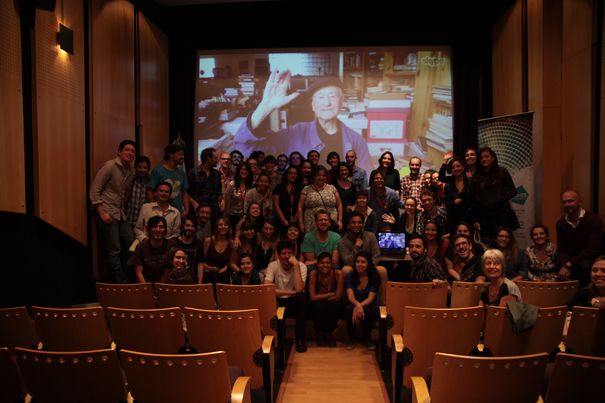Great Talents Buenos Aires closure with the marvelous Jonas Mekas
Another's year edition of the Talents Buenos Aires has come to an end with many encounters, experiences and activities that we have all shared during the last week. An on this occasion it was with great honor to close with the wonderful videoconference with the master of all generations Mr. Jonas Mekas. His words moved us all and his humbleness inspired us through his great experience. We would like to thank all 52 participants of this Talents Buenos Aires edition, you will always be very welcome!!

Talents Buenos Aires and Jonas Mekas
Videoconference with Jonas Mekas by Sebastián Rosal
It is difficult to write without some distance. It sounds strange to begin a chronicle on a videoconference like this, given that this form of communication, by definition, requires a physical separation. It is even more difficult to give an account of one’s own feelings. A necessary explanation: with some luck I will be able to convey what happened, but there is an extra something which I find impossible to transmit, and I believe I am not mistaken if I say that everyone who had the privilege of being present would say the same thing. This text will then be a futile and incomplete attempt to give an account of what will very likely be the most moving moment of this Festival (and of others).
The conference with the founder of the mythic magazine Film Culture and author of Reminiscences of a Journey to Lithuania, As I Was Moving Ahead, Occasionally I Saw Brief Glimpses of Beauty and Outtakes from the Life of a Happy Man, among a dozen of other films, took place within the frame of Talents Buenos Aires’ activities, this year under the motto of “Youth on the March”. Jonas Mekas is a fundamental figure in avant-garde American cinema and culture of the past half-century. What could be better than to establish a dialogue between the public and the young 91-year-old Mekas…
Here are some of the Lithuanian master’s thoughts:
On technology and change: “Everything changes. Each generation changes. Without change everything would be boring. Technology in cinema is also changing, above all with the new cameras. Situations are different and there are now new and different possibilities. With new technology change is inevitable, and in two years everything we now have will probably be old. But change arises from necessity. Then comes business.”
On innocence, film and humanity: “Cinema is innocent. Humanity is horrible. The twentieth century was horrible, and in the current century things seem to remain the same. Evil is everywhere. But there are some moments of happiness that don’t disappear.”
On the city and the country: “There is so much pollution in the city that it has become hell, even though it is the place where I live. The solution lies in the country. Politicians get together and talk among them, but nature and power always manifest themselves”.
On shooting films: “To shoot a film makes me happy, but I don’t know what happiness is. Those filmmakers I respect and admire did not learn to shoot films in the academy. One learns to make films when making films. I do not shoot out of necessity; it is simply an obsession. I have to do it, I have no choice. If I didn’t do it I would become sick. Filmmakers are like Marco Polo, who went in search of perfumes, pepper and everything he did not have at home, out of curiosity.”
On fiction: “My films are all fiction films. I live 24 hours a day, and I only shoot some minutes, therefore it is fiction by condensation and it is not really life. It is a narrative epic about myself, about my friends.”
On the soul and on beauty: “The soul is independent and mysterious. Beauty is in many places, but it is very personal. In a museum there are many paintings and every person stops to look at a different one.”
On his work: “I work alone, but I watch others’ work and show my work to others. Films should be preserved and shown. If you love something you must preserve it. That is exciting and beautiful and it makes me happy. I enjoy all of what I do. Otherwise I wouldn’t do it. Even editing films. A lot of mi edition is present in the shooting. To edit is to structure. I don’t think a lot about titles: it is improvisation, intuition, it simply comes.”
On planning: “I live without a plan, completely open towards the future. I live in the present, this is what humanity depends on.”
The videoconference lasted for about an hour and included a couple of interruptions in the connection, which Mekas took with a lot of humor (“Technology advances but is still imperfect”). The audience responded applauding each new reconnection. At the end, everybody climbed onstage to become part of a photo with the Lithuanian on the other side of the screen. For those present, in its vast majority young film students or people in the profession, it was the end of a moment in our lives we sensed unique and unrepeatable. The best ending to our encounter with our most beloved grandfather of cinephilia.
Clara Picasso-Text Translator Mariángela Martínez Restrepo-Talent Press BA Coordinator

